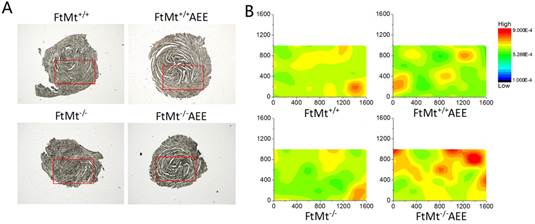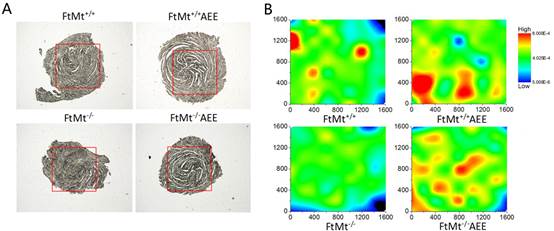| Mitochondrial ferritin protects the murine myocardium from acute exhaustive exercise injury |
| From: PublishDate:2017-06-16 Hits: |
Mitochondrial ferritin (FtMt) is a mitochondrially localized protein possessing ferroxidase activity and the ability to store iron. FtMt overexpression in cultured cells protects against oxidative damage by sequestering redox-active, intracellular iron. Professor Chang and his collaborators (laboratory of molecular Iron metabolism of Hebei Normal University) found that acute exhaustive exercise significantly increases FtMt expression in the murine heart. Further study of the FtMt role in acute exhaustive exercise heart was performed. The paper has been published on November 17th, 2016 in Cell Death and Disease. The team identified FtMt gene disruption decreased the exhaustion exercise time and altered heart morphology with severe cardiac mitochondrial injury and fibril disorganization. The number of apoptotic cells as well as the levels of apoptosis-related proteins was increased in the FtMt-/- mice, though the ATP levels did not change significantly. Concomitant to the above was a high ‘uncommitted’ iron level found in the FtMt-/- group when exposed to acute exhaustion exercise. As a result of the increase in catalytic metal, reactive oxygen species were generated, leading to oxidative damage of cellular components.
Fig.1 FtMt gene knockout increased mouse heart calcium levels after AEE. (a) Depiction of the scan measurement area in the slice of the cardiac apex region. Calcium distribution in a representative position (area measurement (AM)-1.6 × 1.0mm) of the cardiac apex of FtMt+/+, FtMt-/-, FtMt+/+AEE, and FtMt-/-AEE mice, detected by SR-XRF.
Fig.2 Iron distribution in mouse cardiac muscle. (a) Depiction of the scan measurement area in the slice of the cardiac apex region. (b) The iron distribution in a representative position (AM-1.6 × 1.6 mm) of the cardiac apex of FtMt+/+, FtMt-/-, FtMt+/+AEE, and FtMt-/- AEE mice as detected by SR-XRF. The paper showed that acute exhaustive stress gives rise to the formation of ROS that initiate lipid peroxidation, protein oxidation, and cytoplasmic Ca2+ accumulation, eventually leading to myocardial apoptosis and damage. All our data suggest the cardiomyocyte mitochondria in FtMt-/- mice are more sensitive to oxidative stress-mediated injury; FtMt has a protective role against myocardial injury induced by AEE. Moreover, the results represent the first evidence of the function of FtMt in vivo and points to FtMt as a potential therapeutic target to protect the heart from oxidative stress-induced cardiomyopathy.
Article: Wenyue Wu, Shiyang Chang, Qiong Wu, Zhifang Xu, Peina Wang, Yaru Li, Peng Yu, Guofen Gao, Zhenhua Shi, Xianglin Duan and Yan-Zhong Chang*. Mitochondrial ferritin protects the murine myocardium from acute exhaustive exercise injury. 2016. 7(11): p. e2475. |
|
|
| Chinese
- Metal-free efficient photocatalyst for stable visible water splitting——Top ten major scientific progresses in China in 2015
- The nano-resolution imaging platform was awarded the first rate prize of Beijing Science and Technology in 2014
- Beamline 1W1 of BSRF started to runoperate in the couplingparasitic mode of BEPCII
- Synthesis of High Performance Polymer Materials for Field Effect-Transistors
- Surfactant molecular aggregates in green solvents
- GIXRD has played an important role in the characterization of organic thin-film transistors
Science Highlights
Home /
Copyright © 2011 - 2012 Beijing Synchrotron Radiation Facility



